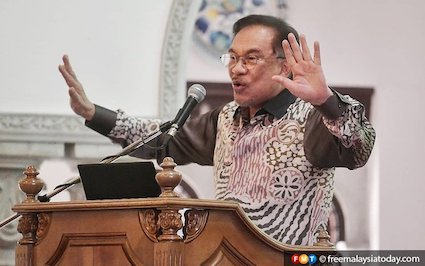Latheefa needs to explain further on release of audio clips, says Anwar

(FMT) – PKR president Anwar Ibrahim has urged Malaysian Anti-Corruption Commission chief Latheefa Koya to explain further the agency’s move in releasing audio recordings purportedly featuring Najib Razak and several officials in discussions over dealings linked to 1MDB and SRC International.
Speaking to reporters after a forum here, Anwar said this was because there were concerns over leaking of secrets and personal conversations.
But the Port Dickson MP said the argument that it was to uphold justice and introduce new information also needed to be taken into account.
“This should be referred to the courts to decide,” he said, adding that all evidence needs to be surrendered to the police.
Some, Anwar said, felt that this could remedy gross injustices of the past.
“Still, I think we need to respect the due process,” he said after officiating the Islam and its Civilisation Forum at Istac-IIUM here today.
On Wednesday, MACC released nine audio clips purportedly featuring, among others, former prime minister Najib, his wife Rosmah Mansor, ex-MACC chief Dzulkifli Ahmad and the crown prince of the United Arab Emirates, Sheikh Mohammed Zayed Al Nahyan.
The disclosure of the recordings drew criticism from lawyers, who said it was illegal to wire tap phone conversations, and that it would lead to a trial by media.
Latheefa has since dismissed the criticism and handed the audio files over to police.
Separately, on Attorney-General Tommy Thomas’ decision not to prosecute the individuals in the gay sex video allegedly implicating PKR deputy president Mohamed Azmin Ali, Anwar said Thomas had made a decision based on the evidence presented to him.
“So I will leave it at that.”
Anwar had previously said if the investigations proved that Azmin was involved in the video clip, then he should resign – a statement that led to a rebuke from Azmin.
Later, he said PKR welcomed the police’s statement indicating that Azmin was not involved, and reiterated the party’s stand against gutter politics.
On the G25 group of former senior civil servants speaking out against apostasy laws, Anwar said the issue concerned the legal remedy for apostasy.
Some ulama, he said, believed it was better to explain and win over those who wanted to leave the religion rather than resort to punitive action.
“This needs to be discussed by religious scholars,” he added.
In its report on “Administration of Matters Pertaining to Islam” released today, G25 said various state laws penalising apostasy, whether by fines, imprisonment or rehabilitation, were inconsistent with the Federal Constitution, which guarantees freedom of religion.

